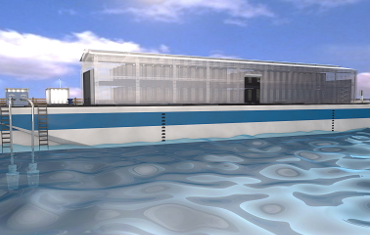Startup Floats First Commercial ‘Data Barge’

Datacenter operators have adopted a range of novel approaches to reducing energy consumption while boosting a key industry metric: power usage effectiveness, or PUE. These approaches range from building datacenters above the Arctic Circle to eliminating the need for cooling through the use of water misters for evaporative cooling.
As datacenter PUE ratings hit a wall, more radical designs are being consider and, significantly, attracting venture funding. The latest design approach from a startup called Nautilus Data Technologies is a floating datacenter. Google (NASDAQ: GOOG) initially proposed the concept, which it tried to patent in 2007. Nautilus, Pleasanton, Calif., said this week it is building the first commercial "data barge" based on a prototype moored off the Mare Island Naval Complex north of San Francisco.
The first commercial "waterborne" datacenter is currently under construction at the naval shipyard and deployment at a "secure port" is scheduled for next year. (Nautilus CEO Arnold Magcale is a former member of the U.S. Navy Special Forces.)
Even the company acknowledges early doubts about the inherent risks involved in floating millions of dollars worth of computing and other IT gear. Jay Kerley, chief information officer of Applied Materials (NASDAQ: AMAT), a major supplier to the semiconductor industry, admitted initial skepticism before becoming an advisory board member. Scott McNealy, co-founder of Sun Microsystems, also advises the startup.
Applied Materials, environmental services supplier Veolia (EPA: VIE) and the U.S. Navy provided equipment for the prototype datacenter launched last summer.
To convince skeptics, Nautilus stresses that it places its floating datacenters on "ocean-worthy barges" that meet U.S. Coast Guard specifications and exceed maritime standards. The barges are former military or construction ships with an expected lifetime of up to 50 years. The barges are then "moored to piers in protected ports," the company said in a statement announcing construction of the first commercial floating datacenter.
Why not just continue building datacenters on terra firma and avoid the risk of being swamped? The startup, which has so far attracted $25 million in venture funding, touts significant power and, by definition, water cooling savings. Nautilus claims its data barge design consumes up to 30 percent less energy than traditional datacenters while saving an estimated 130 million gallons of water annually.
Nautilus said its patented technology uses the water on which it floats for datacenter cooling. Another selling point for datacenter operators in drought-stricken California: The data barge consumes no water since all used for cooling is recycled.
The result, the startup claims, is the industry's "lowest guaranteed power utilization" efficiency rating. While the company did not disclose the PUE rating it would guarantee customers, it did promise annual electricity savings of more than $4 million along with a nearly 20,000-ton reduction in carbon dioxide emissions.
The floating facility occupies 30,000 square feet on a 230-foot barge, but the company claims novel design efficiencies make the data barge equal to an 80,000-square-foot datacenter on land. The data barge can be configured with up to 800 server racks deployed in less than six months.
The company also asserts that a floating datacenters moored in "carefully selected military grade ports" offer greater security and the ability to withstand natural disasters like earthquakes.
Along with its patented cooling technology, Nautilus also claims proprietary datacenter infrastructure management (DCIM) technologies. The new data barge will offer hosting, colocation and cloud services. The startup's approach automates IT infrastructure in an open source environment. Its DCIM approach leverages artificial intelligence and provides what the company calls military-grade security.
CEO Magcale calls his data barge concept among the "most significant datacenter advances in decades." For now, the startup has the private investment and brain trust to back up that claim. So far, it hasn't revealed any new customers. Given Magcale's background, the Navy is a potential user.
Related
George Leopold has written about science and technology for more than 30 years, focusing on electronics and aerospace technology. He previously served as executive editor of Electronic Engineering Times. Leopold is the author of "Calculated Risk: The Supersonic Life and Times of Gus Grissom" (Purdue University Press, 2016).










